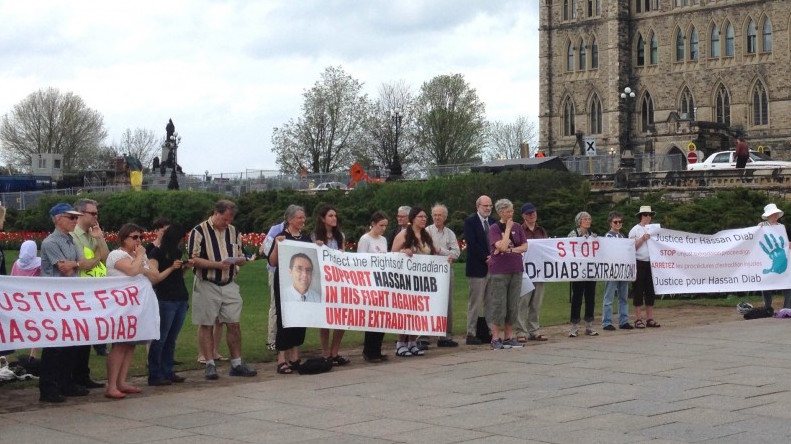Like this article? rabble is reader-supported journalism. Chip in to keep stories like these coming.
This week, a French judge decided to order the release of Hassan Diab while an investigation into his case continues. It is both ironic and embarrassing to see a French judge decide to do what a Canadian judge should have done many years ago: order Hassan Diab a free man!
This Kafkaesque case with a strong “Dreyfus” flavour has been going on for eight long years. It all started in 2008, when Diab, an Ottawa academic, was arrested because French authorities accused him of murder, attempted murder, and other charges related to a 1980 terrorist bombing outside the Rue Copernic synagogue in Paris.
Hassan Diab kept repeating he was innocent and tried to fight all the attempts to extradite him to France.
When this extradition demand was first sent to Canada, one would have thought that the French had a strong case against Diab. But it turned out to be an amateur investigation, with the French prosecutor relying mainly on handwriting analysis and unknown sources of information that might have been obtained under torture.
First, Hassan Diab was imprisoned, then he was released under strict bail conditions, which among others included wearing an electronic bracelet that he had to pay for. His attempt to fight the extradition demand in the Supreme Court of Canada was unsuccessful. Diab was taken out of his cell prison early one morning while his wife, Rania Tfaily, was pregnant with their second child. He was not even allowed to say goodbye. He was shafted by a CBSA officer and put on a plane to supposedly stand trial in Paris.
What’s really disturbing is that this supposed trial didn’t happen in France and even worse, it seems the investigation is still going on. What sort of justice is it to have an investigation lasting over 30 years? And assuming that this is genuinely needed, why has Canada handed over one of its citizens knowing that an investigation is still going on? Would it have been more reasonable and respectful of due process to wait until the investigation is over?
Based on this confusing situation, I can see three explanations:
1. Either the French case is shaky and they have been misleading their Canadian counterparts the whole way, making them believe that they have a strong case and trying to find a sacrificial lamb in the person of Hassan Diab, regardless of his innocence.
2. Or, the Canadians have been negligent and accepting everything that the French were telling them, not resisting the extradition call of one of their own citizens, in an overzealous attempt to show that Canada is committed to the “war on terror.”
3. Or this may be another political witch-hunt against an Arab-Muslim citizen in the post-9/11 context, similar to other tragic cases where victims were arrested merely because of their race, religion, political views or associations, and where the justice system becomes a tool of conviction rather than discernment between guilt and innocence.
At one fundraising event organized by Hassan Diab before his extradition to France, Diab recited a poignant poem titled “J’Accuse” which he wrote in a reference to the famous call of Emile Zola in the Dreyfus Affair, denouncing the anti-Semitism of the French government of 1894. Is it possible, that over a hundred year later, history is repeating itself on this side of the Atlantic, with the French judge already feeling what Canadians failed to feel or see?
It is important that Minister of Justice Jody Wilson-Raybould immediately demand that her French counterpart let Hassan Diab return to Canada to reunite with his wife and children. Due process is not a luxury: it is a pillar of our justice system and Hassan Diab deserves no less.
Monia Mazigh was born and raised in Tunisia and immigrated to Canada in 1991. Mazigh was catapulted onto the public stage in 2002 when her husband, Maher Arar, was deported to Syria where he was tortured and held without charge for over a year. She campaigned tirelessly for his release. Mazigh holds a PhD in finance from McGill University. In 2008, she published a memoir, Hope and Despair, about her pursuit of justice, and recently, a novel about Muslim women, Mirrors and Mirages. You can follow her on Twitter @MoniaMazigh or on her blog www.moniamazigh.com
Image: justiceforhassandiab.org
Like this article? rabble is reader-supported journalism. Chip in to keep stories like these coming.




